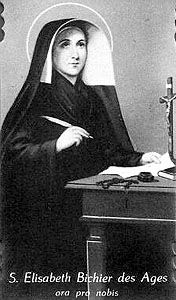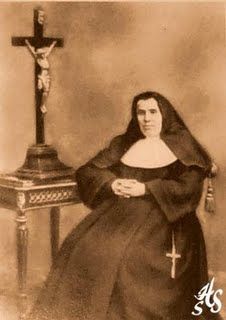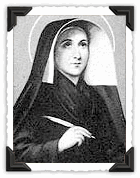Saint Jeanne Elizabeth des Bichier des Anges was born in the Chateau des Anges near LeBlanc, France, Her father, the lord of Anges, sent her to the convent at Poiters to be educated, at approximately age 10. She did not return home until the death of her father (to prevent the family’s property from being confiscated by the state), when she was nineteen years old. On his deathbed, she met Saint Andrew Fournet, who would play an important role in her future.
Following her father’s death, Jeanne Elizabeth found herself embroiled in a court battle to save her family’s property and possessions. Having studied law, she argued the case in court, and won. Expected to marry and make the property her home, Jeanne Elizabeth had no intention of marriage, instead looking to the Lord. On the back of a picture of Our Lady, she had written: "I dedicate and consecrate myself to Jesus and Mary forever."
 With her mother, she moved to La Guimetiere, a town still suffering greatly from the after-effects of the French Revolution. With no priest living there, the town had little in the way of religious guidance or celebration. Jeanne Elizabeth took matters into her own hands, gathering the faithful into one place, studying the Scriptures in a group, and singing hymns to the Lord. Over time, the number of participants grew prolifically.
With her mother, she moved to La Guimetiere, a town still suffering greatly from the after-effects of the French Revolution. With no priest living there, the town had little in the way of religious guidance or celebration. Jeanne Elizabeth took matters into her own hands, gathering the faithful into one place, studying the Scriptures in a group, and singing hymns to the Lord. Over time, the number of participants grew prolifically.Jeanne Elizabeth began to feel called to the religious life, and after her mother’s death, lived for some time in a Carmelite community to experience the rigors and benefits of committing to the Lord. Certain of her call, together with Saint Andrew Fournet (who had begun a similar group of laity in a nearby city), she founded the Daughters of the Cross of Saint Andrew—an order to care for the sick and the poor. Among their other goals was the education of the poor rural citizens of France.
Known for her honesty and charity, she was well respected in the community. Following the death of a poor, sick man she had taken in to help, the police appeared at the convent to question her. They informed her that the man was an escaped criminal, and she had harbored a fugitive. But Jeanne Elizabeth was unafraid, replying calmly to the officer: "I only did what you yourself would have done, sir," she said. "I found this poor sick man, and took care of him until he died. I am ready to tell the judge just what happened."
Appointed the first superior of the Order, Jeanne Elizabeth worked tirelessly to spread the Gospel and establish new houses—by 1830, shortly before her death—she had personally established over 60 houses throughout France. In Igon, in the Basque country, she met Father. Michael Garicoits, who served as spiritual adviser of the house there. With her encouragement, he founded a men’s congregation of the order, named the Priests of the Sacred Heart of Betharram.
Saint Teresa de Jesus Jornet Ibars was born in Catalonia, Spain. She was raised by pious, Christian parents, but due to financial reasons was sent to live with her aunt on the family farm. There, she was expected to work her daily chores—many of them quite strenuous and exhausting—which she did without complaint. From this early age, Teresa demonstrated great charity, but did so discreetly so as not to attract praise or attention herself. Despite her grueling chore schedule, she managed to attend school, becoming a teacher in Lleida.
Despite her successful education, Teresa felt drawn to religious life. She attempted to enter a number of convents—both the Poor Clares and the Carmelite Order-- failing entry at each due to laws established in Spain at the time. Not to be dissuaded, on the advice of her spiritual director, Teresa decided to form her own congregation—an order that would care for the elderly who lacked both financial resources and family. In 1872, in Barbastro, Spain, she organized the Little Sisters of the Poor (originally called the Little Sisters of the Abandoned Aged).
 At that time, she took the name Teresa de Jesus, and served as the order’s first superior. She established additional houses in Valencia and then in Zaragoza, and through her considerable zeal for the work of God, nearly 60 more houses for her congregation prior to her death. Mother Teresa of Jesus taught her Sisters to sacrifice their own personal comforts for that of the men and women for whom they cared, to the point of denying themselves even coats in the winter, which could be given to them. In addition to her intense commitment, she was noted for a strong air of serenity all her life, all of which drew many young women to join in her work.
At that time, she took the name Teresa de Jesus, and served as the order’s first superior. She established additional houses in Valencia and then in Zaragoza, and through her considerable zeal for the work of God, nearly 60 more houses for her congregation prior to her death. Mother Teresa of Jesus taught her Sisters to sacrifice their own personal comforts for that of the men and women for whom they cared, to the point of denying themselves even coats in the winter, which could be given to them. In addition to her intense commitment, she was noted for a strong air of serenity all her life, all of which drew many young women to join in her work.The Order flourished under her direction, and spread across the whole of Spain (and later elsewhere, including America). Saint Teresa is known for saying "The more poor people, the more benefactors.” With every house, she traveled further to find those who would support the work of the Lord through financial contributions and vocations. It was exhausting work, but she never expressed anxiety, proud and confident in the Lord’s providence.
The lives of both Saint Jeanne Elizabeth and Saint Teresa de Jesus demonstrate to us that there is much we can each accomplish in the world—serving the Lord through service to one another. Saint Jeanne Elizabeth saw poor uneducated rural communities in need of spiritual guidance. Saint Teresa de Jesus witnessed the elderly, abandoned and unable to provide for themselves. Through the grace of God, and the courage of these great women, both created the change that was needed. How often to do see what needs to be done, and chose not to do it? How often do we ignore the call of the Lord to help those in need, those in our own communities? How might we better the lives of our fellow man in service to Christ?
Inspired by the origins and spiritual history of the Holy Rosary, we continue our meditation on the psalms, one each day, in order, for 150 days.
Psalm: Psalm 123: Israel’s Prayer in Persecution
1 I lift up my eyes to you,
to you whose throne is in heaven.
2 As the eyes of slaves look to the hand of their master,
as the eyes of a maid look to the hand of her mistress,
so our eyes look to the LORD our God,
till he shows us his mercy.
3 Have mercy on us, O LORD, have mercy on us,
for we have endured much contempt.
4 We have endured much ridicule from the proud,
much contempt from the arrogant.
Day 238 of 365
Prayer Intentions: Charity, Service to others, Social Justice.
Requested Intentions: Restoration of health and successful marriage (A); Health and employment for a friend (G); Restoration of health (M); Answers to prayers (A); Conversion of son and family (S); Successful business, home purchase, health of brother (SJ); Successful delivery of a baby girl (U); Successful return to the faith (A); Emotional, physical, and financial healing (D); Diagnosis and recovery (A); For a successful relationship (J); For healing of a head injury (S); For employment for two sons (R); For sanctification of a fried considering a move (A); For friends experiencing job difficulties (A); Health, employment, and conversion of a son (S); Health, financial success, positive move (S); Financial security, and health, guidance, and protection for children (ML); For a sick grandmother (R); For the building of a Catholic community, family, and law practice (M); Those suffering from depression (J); Successful adoption (S); Healing of a father battling cancer (S).
Psalm: Psalm 123: Israel’s Prayer in Persecution













0 comments:
Post a Comment
Thanks for leaving a comment. If you wish to submit a prayer request, however, please do so above, using the "Contact" tab.